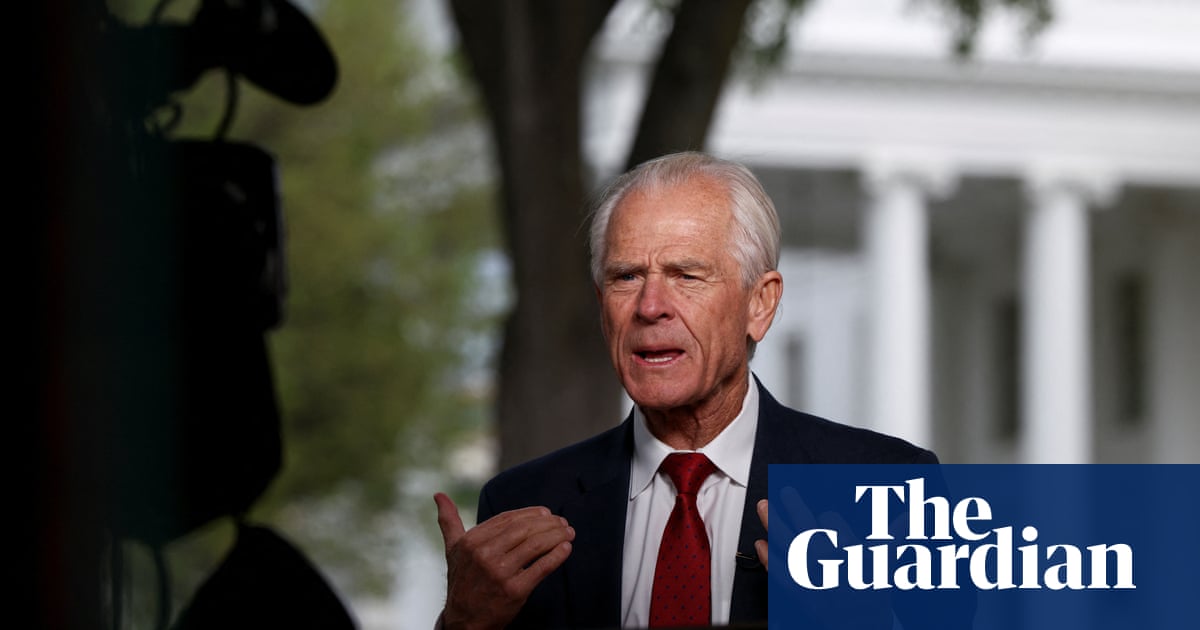Elon Muskcalled him “dumber than a sack of bricks” but, in the raw contest for political power, Peter Navarro has outsmarted the billionaire.
The tumult in global trade shows that for now it is the 75-year-old economist, not Musk, who hasDonald Trump’s ear in the Oval Office.
Navarro is the US president’s chief trade adviser and the intellectual driving force behind the global tariffs andtrade war with China. The chaos and uncertainty have been too strong even for Musk, the great disrupter, but Navarro’s silky mien still assures the US all is well.
Even after the tech tycoon publicly compared him to a sack of bricks, and added that he was “truly a moron”, Navarro retained his composure. “I’ve been called worse,” hetold NBC.
That is true. Navarro has been called a charlatan and a criminal who risks driving the world economy off a cliff.
It is a remarkable metamorphosis for a man who a decade ago was a little-known academic nearing retirement at the University of California, Irvine, a respected, stolid institution in Orange County.
Then the professor’s hawkish views on China caught the eye of Trump’s 2016 presidential campaign and vaulted him to Washington, where he played key roles in economic policy, the Covid pandemic and the attempt to overturn the 2020 election, a vortex that landed him in jail – for contempt of Congress – only for him to re-emerge, more influential than ever, in Trump’s second administration.
“This is the land of reinvention, both cosmetic and ideological, and he is part of that,” said John Pitney, a political scientist and author at Claremont McKenna College.
Critics worry that Navarro is trying to reinvent economic rules and the postwar global order with improvisation and bluster that could trigger recession and backlash. For Trump, Navarro is the expert who can articulate a daring and necessary pivot to protectionism.
Navarro’s early life, and career, suggested a different trajectory. The son of a musician and a secretary, he grew up on the east coast and obtained a master’s degree in public administration and then a PhD in economics from Harvard. Hisdoctoral dissertationwas not on trade but on corporations’ charity motives.
He taught economics at San Diego universities and did research on public utilities before landing a tenure position as professor of economics and public policy at UCI in 1989. Tanned and svelte, he had the look of a glossy politician and ran as a Democrat for elected office, including for mayor of San Diego and Congress, but lost.
In 2001 he switched to writing get-rich investing books such as If It’s Raining in Brazil, Buy Starbucks: The Investor’s Guide to Profiting from News and Other Market-Moving Events.
In 2006 the professor took another swerve by publishing the first of a series of books, and accompanying documentaries, that assailed China as an insatiable menace that bullies, lies and cheats, especially on trade rules through currency manipulation, illegal export subsidies, intellectual property theft and polluting sweatshops.
There is no evidence of causality but Navarro’s alarm coincided with California’s proliferating number of Chinese investors and students, notably at UCI, which prompted racially tinged nicknames such as the University of Chinese Immigrants and the University of Caucasian Isolation.
Other economists also accused Beijing of unfair practices but Navarro’s radical critique put him on the fringe.
In 2016 Trump reportedly instructed his son-in-law Jared Kushner to do research to bolster his views on China. Kushner found Navarro’s book, Death By China, on Amazon, and Navarro ended up advising the campaign.
In aninterview that year with the Guardiannear his Laguna Beach home, Navarro endorsed Trump’s use of the word rape to characterise Beijing’s impact on the US. “It’s an apt description of the damage and carnage that China’s trade policies have wrought on the American economic heartland. What’s happening is rapacious.” He also endorsed Trump’s proposed 45% tariffs on Chinese goods, which he said would compel Beijing to back down. “We’re already in a trade war with China. The problem is we’ve not been fighting back. Trump, through tariffs, wants to call a truce.”
Trump had few credentialed academics on his team so Navarro served a useful purpose, Pitney said. “He provided a degree of scholarly cover for what Trump was saying. That’s why he was brought into the administration.”
Navarro’s standing in the White House survived the disclosure that his bookscited a fictitious expert, Ron Vara, that is an anagram of Navarro. He sought to shrug off the deception by calling it an “inside joke” with himself and a “Hitchcockian writing device”.
In Trump’s first administration, more mainstream economic advisers prevailed and there was no trade war. Even so, Navarro expanded his remit to public health during the pandemic, which afforded more opportunity to assail China, and established personal chemistry with the president that made him a survivor amid White House personnel flux.
After his chief lost the 2020 election, Navarro promoted the theory that the election was rigged and sought to delay its certification. For rebuffing a congressional committee that investigated theJanuary 2021 attack on the Capitolhe was found guilty of criminal contempt and last year served four months in prison.
Now back in the White House as Trump’s senior counsellor for trade and manufacturing, Navarro’s influence has been felt intariffs, stock market volatility andgrim economic warningsdespite a pause in the most severe tariffs for 90 days.
Navarro has a combative streak yet he chose to project indifference over Musk’s insults. “It’s no problem,” he told CNN. A White House spokespersonshrugged offthe row: “Boys will be boys.”
